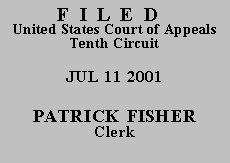

| WILLIAM MCNALLY, | No. 01-1059
(D.C. No. 00-Z-2278) (D. Colo.) |
McNally then filed the case at bar alleging violations of his Sixth Amendment Right to Counsel, his Fifth and Fourteenth Amendment rights to due process, the Contracts Clause, failure properly to train and supervise attorneys working for the Colorado State Public Defender, and a conspiracy to violate his civil rights. McNally's case was filed pro se, and the district court granted his motion to proceed in forma pauperis pursuant to 28 U.S.C. § 1915(a)(1). The court dismissed McNally's case under § 1915(e)(2)(B)(i) after finding that it was frivolous (see generally Doc. 6), and then denied him leave to appeal in forma pauperis, finding that McNally's appeal was not taken in good faith.
For substantially the reasons set forth in the district court's order, we find that McNally has failed to raise a nonfrivolous argument for relief, and accordingly we deny his motion to proceed in forma pauperis and dismiss his appeal.
As the district court noted, McNally has not alleged that a change in law impaired a contractual relationship, and therefore he has failed to allege facts sufficient to support his claim under the Contracts Clause. See General Motors Corp. v. Romein, 503 U.S. 181, 186 (1992). McNally's remaining claims fail because he has failed to establish state action by Defendants, as is required to bring a claim under 42 U.S.C. § 1983 for deprivations of rights under the Constitution and laws of the United States.(1) "[A] public defender does not act under color of state law when performing a lawyer's traditional functions as counsel to a defendant in a criminal proceeding." Polk County v. Dodson, 454 U.S. 312, 325 (1981). Although allegations of a conspiracy between McNally's attorneys and state actors might be sufficient to demonstrate Defendants acted under color of law, "mere conclusory allegations with no factual averments are insufficient; the pleadings must specifically present facts tending to show agreement and concerted action." Hunt v. Bennett, 17 F.3d 1263, 1268 (10th Cir. 1994) (citation and quotations omitted). McNally has not pleaded specific facts demonstrating agreement and concerted action, and therefore he cannot demonstrate that Defendants acted under color of state law.
In sum, we find McNally's appeal was not taken in good faith, we deny his application to proceed in forma pauperis, and accordingly we dismiss his appeal.
ENTERED FOR THE COURT
David M. Ebel
Circuit Judge
*.After examining appellant's brief and the appellate record, this panel has determined unanimously that oral argument would not materially assist the determination of this appeal. See Fed. R. App. P. 34(a)(2) and 10th Cir. R. 34.1(G). The case is therefore ordered submitted without oral argument. This Order and Judgment is not binding precedent, except under the doctrines of law of the case, res judicata, and collateral estoppel. The court generally disfavors the citation of orders and judgments; nevertheless, an order and judgment may be cited under the terms and conditions of 10th Cir. R. 36.3.
1.McNally argues on appeal that he relied on § 1983 to support only his conspiracy claim, and that the rest of his claims are brought under 28 U.S.C. § 1331. Although § 1331 creates original jurisdiction in the district courts for civil actions arising under the Constitution, laws, or treaties of the United States, it does not itself create a cause of action upon which a plaintiff may seek relief. McNally must instead turn to § 1983 to recover for violations of his federal rights. Cf., e.g., Albright v. Oliver, 510 U.S. 266, 271 (1994) (Section 1983 "provides a method for vindicating federal rights elsewhere conferred" (quotations omitted)).